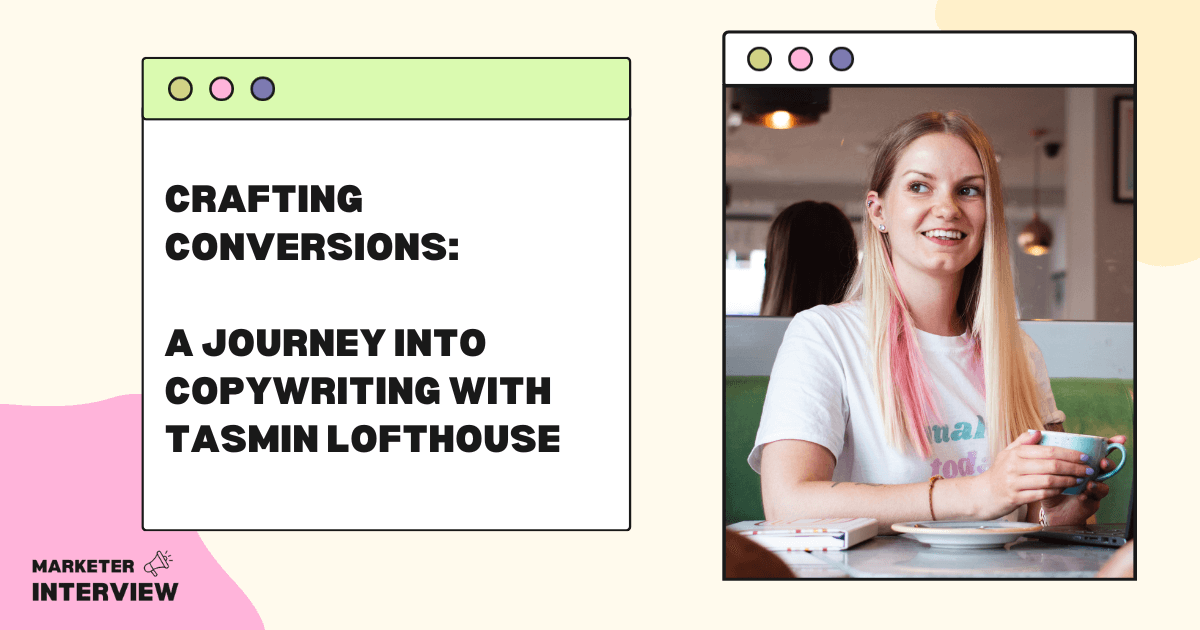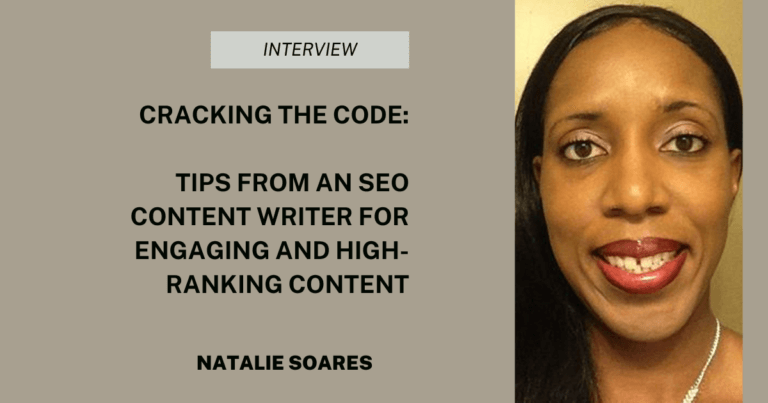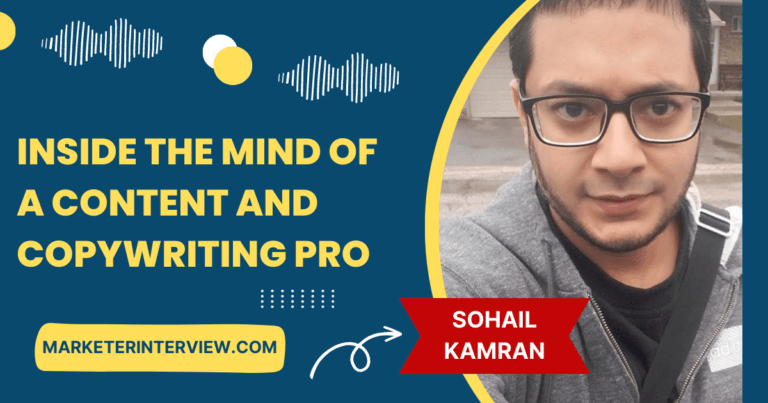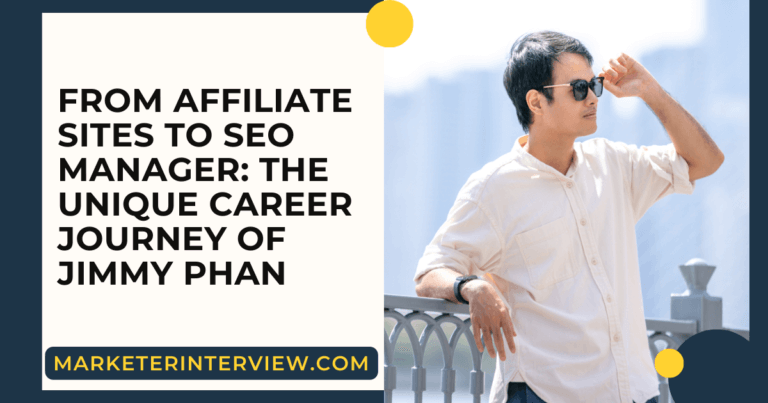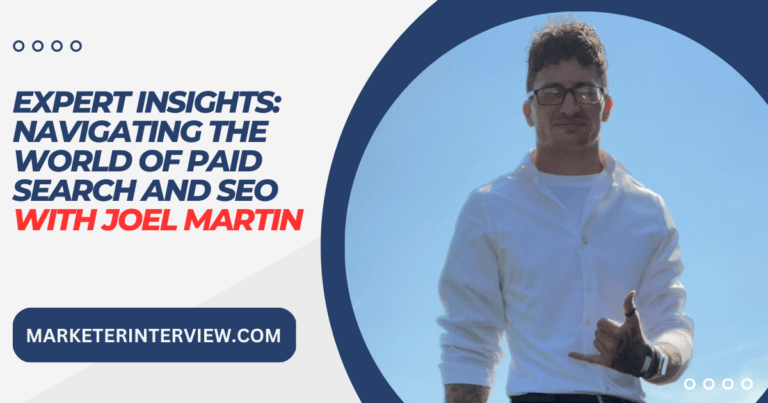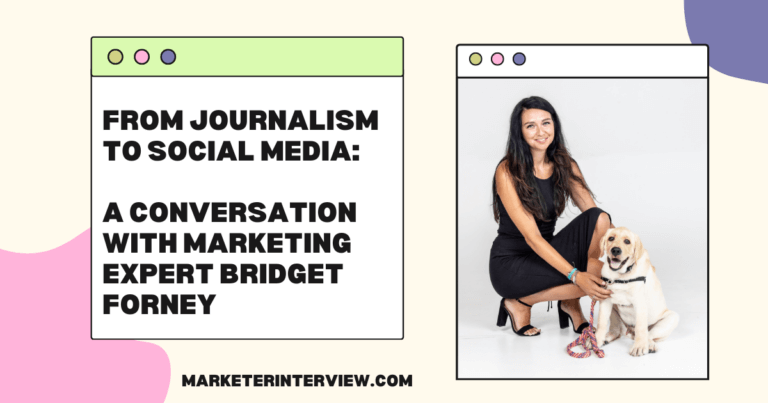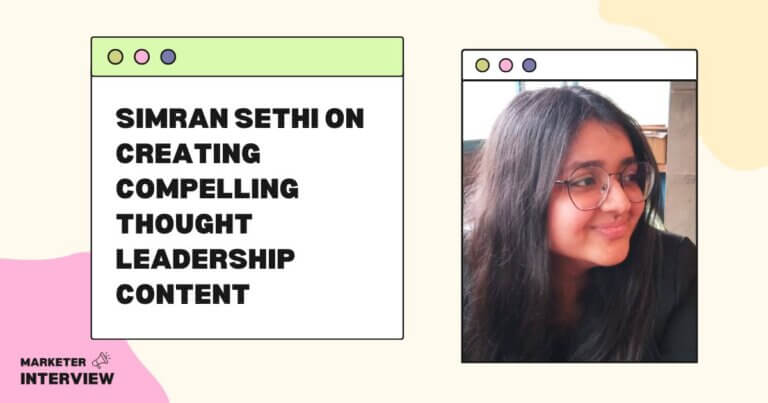Crafting Conversions: A Journey into Copywriting with Tasmin Lofthouse
Welcome to another exciting edition of Marketer Interview!
Today, we explore the fascinating world of conversion copywriting and messaging strategy with Tasmin Lofthouse. Tasmin is a Conversion Copywriter and Messaging Strategist at Fika Digital.
With a background in Consumer Psychology and over 10 years of marketing experience, Tasmin brings a unique blend of research-backed copywriting and a deep understanding of human behavior to help businesses shine and attract their dream audience.
Let’s embark on a journey with Tasmin as she shares insights into her career, the intricacies of conversion copywriting, and the dynamic intersection of data, psychology, and content marketing.
Contents
- 1 How did your marketing journey begin, especially from a Consumer Psychology background?
- 2 What challenges do you often encounter as a conversion copywriter, and how do you overcome them?
- 3 Tell us about when you decided to start your own business after facing redundancy. How did that experience shape your approach to your work today?
- 4 With a focus on content marketing and SEO, can you share some strategies that have proven effective in building an online presence and driving organic traffic?
- 5 In conversion-focused copywriting, could you walk us through combining data and psychology to create compelling messages?
- 6 What role do you believe personal branding plays in the success of businesses today, and how do you incorporate it into your copywriting strategy?
- 7 You mentioned your love for data and analytics. Please highlight some key metrics or tools you rely on to measure the success of your copywriting efforts.
- 8 As a messaging strategist, how do you ensure consistency in brand communication across various channels, and why is this important for businesses?
- 9 What advice do you have for aspiring copywriters and marketers who want to excel in the ever-evolving digital marketing landscape?
- 10 On a lighter note, as an adventure enthusiast, how do your passions influence your creativity and work-life balance?
How did your marketing journey begin, especially from a Consumer Psychology background?
When I look back over my career journey, it always feels like a full-circle moment. When I was younger, I loved to write — poetry, stories, books, magazines, you name it! As a teenager, I thought I would be a journalist when I grew up.
Then, I went to college and discovered psychology. I was fascinated. So, I went to study psychology at university. I wasn’t interested in social psychology or clinical psychology.
But, I was obsessed with behavioral and consumer psychology. I loved learning how our emotions, mental models, and experiences could impact buying decisions. I’d say that’s where the idea of going into a career in marketing first cropped up for me.
After university, I interned at a PR agency and got my first marketing job in a manufacturing company. That was 10 years ago, and now I’ve narrowed my focus down to conversion copywriting and messaging strategy — taking me back to being a writer, but with a consumer psychology and marketing twist.
What challenges do you often encounter as a conversion copywriter, and how do you overcome them?
Writer’s block is a challenge that all copywriters face at one time or another. But I think I’ve developed a few strategies to keep writer’s block at bay and help me swiftly overcome it if it does arise.
Writer’s block may come up because you don’t know the subject well enough, you’re feeling stressed or emotionally distracted, or you lack inspiration and creativity.
Data always leads my writing. I’ll dive deep into the business I’m writing for and its audience, market, and competitors. I gather and analyze as much data as I can get my hands on. Customer surveys and interviews are my favorite way of collecting juicy data for writing. This data collection and analysis means I have a solid understanding of the subject matter, helping minimize writer’s block.
I’ll step away if I struggle to write because I have zero emotional capacity. Even if it’s just for 2 minutes to walk out of the room, give myself a pep talk, and come back again. Trying to write when you’re not in the right headspace will only make it more challenging. So, it’s more productive to step back, calm your mind, and come back with more clarity and capacity.
If I have writer’s block because my creativity has dried up, I will lean on trusty formulas, frameworks, and exercises. Setting a timer and cracking out as many headlines as I can write before the alarm sounds can be a fun way to warm up inspiration and creativity.
The only rule is to write down everything that comes to mind. No self-editing allowed. Once you’ve done something like that, you’ll find writing much more straightforward. And if you’re still struggling, use copywriting formulas and frameworks to structure your writing. Use those to get an okay first draft, then add the creativity later.
Tell us about when you decided to start your own business after facing redundancy. How did that experience shape your approach to your work today?
From doing Dragons Den’s style pitches and selling homemade cookie mix jars at university to starting a metal stamping business venture and working with brands as a blogger and content creator, I think there’s always been a part of me that wanted to ‘be my boss.’
But, I always stuck to the safe route of having a full-time job.
Then, I was made redundant from my last employed role. Two days before Christmas, I was brought into the board room and told my role was being made redundant. I remember thinking, “This is it. This is my chance to go freelance finally”. I had nothing to lose.
I sat down at my desk, sobbing out of frustration, and tweeted to say my books were open for freelance work. That tweet snowballed. It resulted in over 500 retweets and an inbox overflowing with leads. That got me my first couple of freelance clients.
But being made redundant instilled in me a mindset that I must bet on myself. I get to decide what my future looks like. If I want my business to succeed, I must make it happen.
Plus, being made redundant also made me realize that having a full-time employed position isn’t the ‘safe’ option I thought it was. Having your earnings split across various income sources or clients is much safer.
I’m grateful I was made redundant. It got me to where I am now.
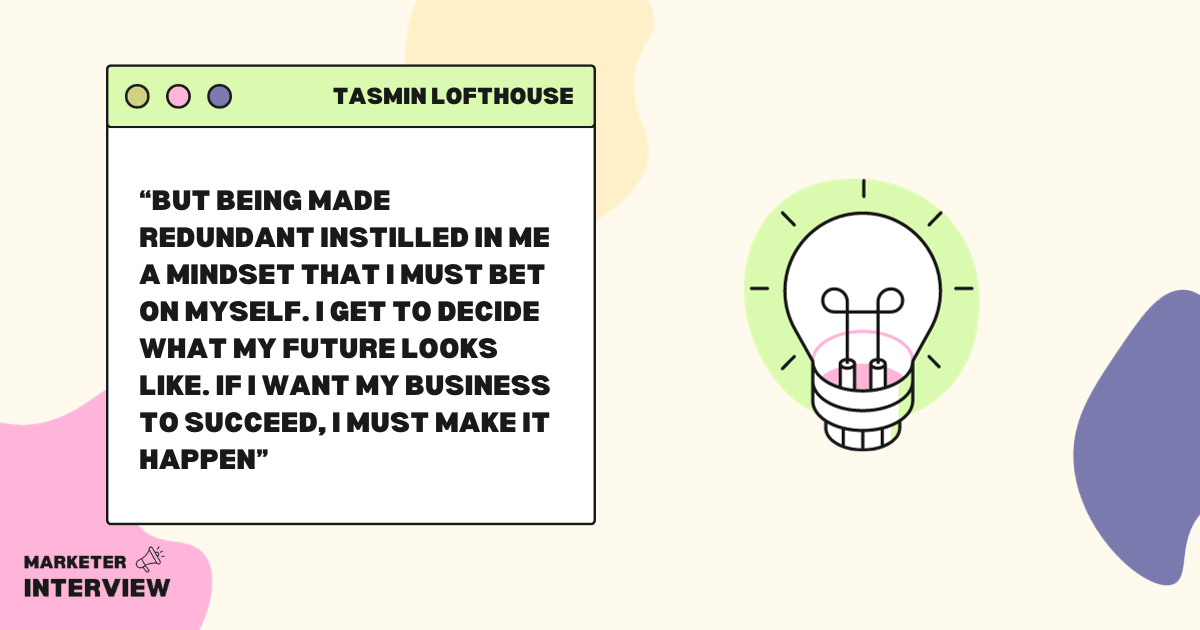
Regarding content marketing and SEO, I try not to lean too heavily into the content SEO approach of finding and writing for keywords.
I always lead with audience research. Spend time getting to know who you are writing for. Understand their challenges, needs, and search behaviors. Once you have a clear idea of what they are looking for, you can write content tailored to your audience.
Writing for people first, not Google first, has always been my most effective strategy for driving organic traffic. If you write genuinely valuable, high-quality content for people, you’ll naturally create content that performs well organically.
Of course, ensure the content follows best practices for on-page SEO… but start with the people and how you can help them.
In conversion-focused copywriting, could you walk us through combining data and psychology to create compelling messages?
Data comes first. I’ll collect as much data as I can across the brand, its target audience, and the market as a whole.
I’ll then analyze that data through a psychological lens. This allows me to write content that connects with the audience deeper, addressing all the emotional and logical phases people go through when making purchase decisions.
What role do you believe personal branding plays in the success of businesses today, and how do you incorporate it into your copywriting strategy?
We live in the ‘business influencer’ era, where people buy into the people at the forefront of the company more than they buy into the products or services sold.
Everyone has a personal brand, whether you believe in it or not. Your brand is an intentional representation of how you want to be seen by others. I spend time mapping out their personal brand when working with founder-led companies or entrepreneurs. I want to know what shapes and drives them as a person. And I want to know what makes them unique.
Finding their brand is critical to writing copy that captures their authenticity, shows people who they are, and helps their target audience resonate with them.
You mentioned your love for data and analytics. Please highlight some key metrics or tools you rely on to measure the success of your copywriting efforts.
Once the copy has been written, I like to keep track of its performance. I’ll use an SEO tool like SERanking to measure organic performance through keyword rankings, SERP performance, and backlinks.
Then, I’ll use Google Analytics and Search Console to monitor the content performance within the website, looking at whether the conversion rate increased, analyzing the difference in page depth or engagement time, and exploring what paths the users take when exploring the website, for example.
The exact KPIs I measure will depend on the client’s goals. But, I like to get a complete picture of how that content performs in the broader customer journey and their online experience with the brand.
As a messaging strategist, how do you ensure consistency in brand communication across various channels, and why is this important for businesses?
You must clearly understand your brand personality and voice if you want consistent communications across all channels.
A floating idea in your mind isn’t enough… and neither is a couple of pages in a brand guidelines document. You have to understand and resonate fully with your brand personality and voice.
Then, create a well-structured messaging guide that shows exactly what your brand voice means, why that is your voice, and how to use it across different channels. This makes it easy for you, your team, and anyone else talking for your brand to uphold your brand personality.
Having consistent messaging can help you make your brand more memorable. More importantly, it helps you attract like-minded prospects with values and personalities that complement yours.
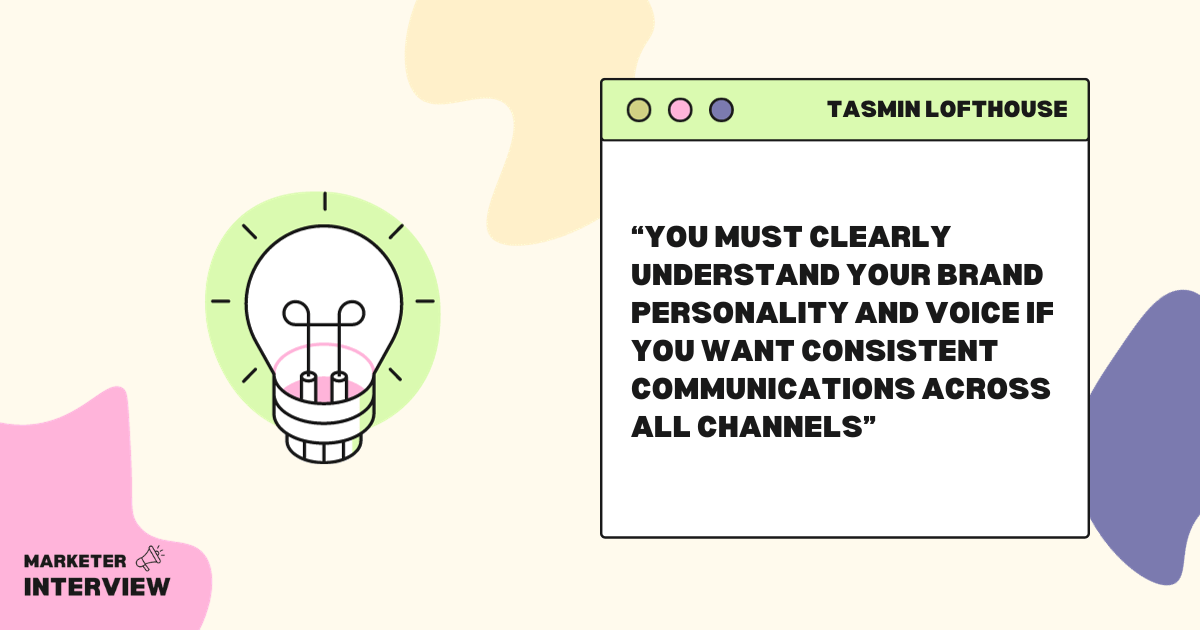
What project or accomplishment are you particularly proud of in your decade-long marketing journey, and what lessons did it teach you?
Honestly? Starting my own business and betting on myself is my biggest accomplishment. I could shout about client results and ways I’ve helped them in their business. And I love helping other business owners achieve their goals and bring their vision (and voice) to life.
But I think my proudest accomplishment is that I am doing this. We don’t celebrate ourselves enough, so I’m patting myself on the back for once. It’s taught me that I can do much more than I probably give myself credit for.
What advice do you have for aspiring copywriters and marketers who want to excel in the ever-evolving digital marketing landscape?
I am always here to champion and support aspiring copywriters and marketers. If I could give them any advice, it would be this:
- Find your community – speak to people, ask questions, and find people to help you (and who you can help) on your journey.
- Be open — Open to learning, trying new things, and saying yes to things that scare you.
- Trust yourself — Trust that you can do it and trust in yourself to set boundaries and say no to things that don’t serve you.
On a lighter note, as an adventure enthusiast, how do your passions influence your creativity and work-life balance?
I make time for the outdoors as much as I can. However, I could also squeeze more outdoor time into my working day.
I started my business in January 2020, meaning my first few years in business were shrouded in pandemics and lockdowns. I spent much time at home, working on my business and doing nothing else.
So, now I try to make a conscious effort to make time for non-work passions — whether going for a hike, a wild swim, or catching up with a friend over brunch. You can’t work at total capacity 24/7. If you try, you’ll burn out. You need that time away to fill your cup, look after yourself, and let your cortisol levels rest so you can approach work feeling refreshed and productive.
